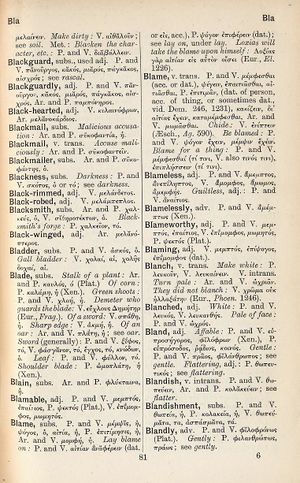blame
ὡς οὐδὲν γλύκιον ἧς πατρίδος οὐδὲ τοκήων γίνεται, εἴ περ καί τις ἀπόπροθι πίονα οἶκον γαίῃ ἐν ἀλλοδαπῇ ναίει ἀπάνευθε τοκήων → More than all pleasures that were ever made parents and fatherland our life still bless. Though we rich home in a strange land possess, still the old memories about us cling.
English > Greek (Woodhouse)
subs.
P. and V. μέμψις, ἡ, ψόγος, ὁ, αἰτία, ἡ, P. ἐπιτίμησις, ἡ, Ar. and V. μομφή, ἡ.
Lay blame on: P. and V. αἰτίαν ἀναφέρειν (dat. or εἰς, acc.), P. ψόγον ἐπιφέρειν (dat.); see lay on, under lay.
Loxias will take the blame upon himself: Λοξίας γὰρ αἰτίαν εἰς αὑτὸν οἴσει (Eur., El. 1226).
v. trans.
P. and V. μέμφεσθαι (acc. or dat.), ψέγειν, ἐπαιτιᾶσθαι, αἰτιᾶσθαι, P. ἐπιτιμᾶν, (dat. of person, acc. of thing, or sometimes dat., vid. Dem. 246, 1231), κακίζειν, διʼ αἰτίας ἔχειν, καταμέμφεσθαι, Ar. and V. μωμᾶσθαι.
Chide: V. ἐνίπτειν (Aesch., Ag. 590).
Be blamed: P. and V. ψόγον ἔχειν, μέμψιν ἔχειν.
Blame for a thing: P. and V. μέμφεσθαί (τί τινι, V. also τινός τινι), ἐπιπλήσσειν (τί τινι).

